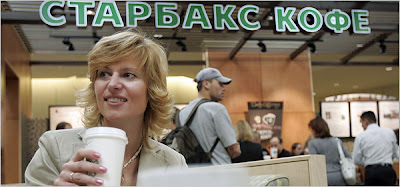Friday, September 07, 2007
After Long Dispute, a Russian Starbucks

KHIMKI, Russia, Sept. 6 — With the hiss of an espresso machine and a note in Russian explaining the meanings of “tall,” “grande” and “venti,” Starbucks opened its first coffee shop in Russia on Thursday in a mall in this city near Moscow.
The opening sealed a victory for the company in a fight with a trademark squatter who had kept Starbucks from coming to Russia for more than three years, just as a coffeehouse culture was emerging here. Starbucks refused to pay the squatter to yield the Starbucks name in Russia and eventually prevailed in court.
The dispute illustrates the challenges Starbucks will face as it strives to expand outside the United States, where growth is expected to slow. Starbucks intends to open 20,000 coffee shops overseas while expanding to about that number at home.
With the opening of the first Russian cafe, Starbucks, which is based in Seattle, now operates in 43 countries, said Carole Pucik, a Starbucks spokeswoman. The company plans to open a flagship Russian shop on Old Arbat Street, a prime address in downtown Moscow, later this year. “We see lots of opportunity here,” Ms. Pucik said.
The menu of basic coffee drinks is the same as in the United States, and indeed everywhere in the world, Ms. Pucik said. The sandwiches and baked goods are adapted for local tastes. The Russian shop, for example, offers a mushroom-and-cheese sandwich.
In Russia, the prices are a reflection of the oil-driven economic boom here. A tall filter coffee costs 75 rubles, or about $2.92. The most expensive item on the menu was a venti mocha, for 230 rubles, or about $8.96. A venti mocha at Starbucks in New York costs $4.71.
Starbucks first registered its trademark in Russia in 1997 but did not open any shops here because of the economic crisis of 1998. Then in 2002, as the Russian economy was picking up again, Sergei A. Zuykov filed a request with Russian authorities to cancel the chain’s trademark because it had not been used in commerce in Russia. He then registered Starbucks in the name of a Moscow company he represented as a lawyer.
Mr. Zuykov, a lawyer and a former car alarm salesman who says he has claimed many brands, defended his stake on the name Starbucks for three years, saying that if Starbucks would pay $600,000, he would abandon his registration. The company refused to pay.
He lost his case in November 2005 as Russia stepped up its bid for membership in the World Trade Organization and hewed closer to international standards for the protection of intellectual property.
Despite this setback, which allowed competitors a head start, Starbucks said it saw plenty of room for more coffee shops in Russia. Ms. Pucik, the Starbucks spokeswoman, cited data from Euromonitor International, a market research company, showing that Moscow has one coffeehouse for every 3,187 people. New York has one for every 365 people, and Paris one for every 126.
Greenspan Hypes his new book -
Interesting how he uses the word "Turbulence" - His new book - coming out this month- has the same word in the title.....
 Greenspan says market turbulence similar to prior crises
Greenspan says market turbulence similar to prior crisesWASHINGTON (AFP) — Former Federal Reserve chairman Alan Greenspan compares the current financial market turbulence to prior crises that have engulfed stock markets and the US economy.
Greenspan, who stepped down as Fed chairman in January 2006, compared the present turmoil to prior crises triggered by hedge fund collapses, excessive land speculation and a bank panic, according to remarks in the Wall Street Journal on Friday.
"The behavior in what we are observing in the last seven weeks is identical in many respects to what we saw in 1998, what we saw in the stock market crash of 1987, I suspect what we saw in the land boom collapse of 1837 and certainly (the bank panic of) 1907," Greenspan said late Thursday, according to the online report.
The Journal said Greenspan made his remarks at an event hosted by an academic journal in Washington.
The giant Long Term Capital Management hedge fund collapsed in 1998 sparking fears on Wall Street that its implosion and losses could trigger much bigger losses across Wall Street.
The former Fed chief spoke after US and global financial markets have endured weeks of volatility sparked by America's housing downturn and rising mortgage defaults which have led major banks to tighten their lending practices.
Some banks and financial firms have also revealed hefty losses tied to mortgage-backed securities purchased during the years-long housing boom which ran out of steam in early 2006.
Greenspan said fear had now replaced euphoria.
He said "the expansion phase of the economy is quite different, and fear as a driver, which is going on today, is far more potent than euphoria."
The former Fed chairman, who has been replaced by Ben Bernanke, said "the human race has never found a way to confront bubbles."
Greenspan works as a private consultant and author.

